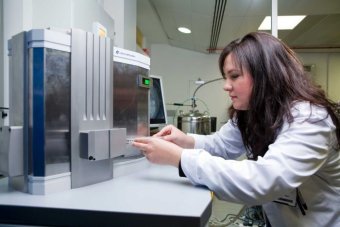'Brain drain' ahead with scientists leaving laboratories in droves: Deloitte report
Updated
Australia's scientists say the "innovation nation" is crumbling with a study revealing more scientists are considering leaving the profession because of limited career prospects.
Key points:
- 80 per cent of scientists surveyed are considering leaving the profession
- Lack of career opportunities and job security is a primary concern
- Government initiative delivering $1b annually not available until 2018
New research by the Australian Society for Medical Research (ASMR) revealed almost one in four scientists were "uncertain" about whether they would be employed next year because it was so difficult to get research funding.
"Despite science and innovation being the platform for Australia's future economic strategy, Australia faces an imminent brain drain," the report found.
ASMR president Dr Sarah Meachem said more than 80 per cent of those surveyed were considering leaving scientific research for another career.
"The majority of the researchers [considering leaving] are mid-career scientists," she said.
The report said five years of static National Health and Medical Research Council funding had led to falling grant rates and a decline in the scientific workforce.
It found lack of career opportunities and job security were the primary areas of concern.
Dr Meacham said the fact that so many mid-career scientists are thinking of leaving science was particularly worrying.
"What's really important to say is these people are 10, 20, 30 years into their careers and are highly skilled and talented," she said.
"If we lose them, we lose them forever and we won't have the next generation of leaders for our health and medical researchers."
The report found 15 per cent of Australia's scientific workforce had already left, which was "the tip of the iceberg".
Federal initiatives such as the Medical Research Future Fund will deliver returns of up to $1 billion per annum.
But Dr Meachem said that money would not be delivered until at least 2018.
"That means the sector will have received no real increase in funding for a total of almost 8 years," she said.
Some scientists in the survey had already moved overseas because of a lack of scientific funding in Australia.
"Sixty-three per cent said better funding for their research had a strong influence on their reasons for leaving Australia," the report said.
A second research paper by Deloitte Access Economics reveals since 2013, the number of scientists funded by the National Health and Medical Research Council grants has fallen by 16 per cent.
In addition, it found more scientists were only able to get part time, rather than full time employment in medical research.
Frustrations as research money dries up
One scientist who knows the difficulties of securing funding is 32-year-old Nyssa Drinkwater.
She is working as a Postdoctoral Research Fellow at Monash University, developing drugs for diseases such as malaria.
After completing a PhD at the University of Queensland, she worked at King's College London, then returned to Monash University in 2014.
But despite her success, the money for her research has run out.
"It's difficult for me to consider other careers because I love what I do and I think it can help people," she said.
Dr Drinkwater said many of her friends and colleagues are in a similar position.
"My main feeling is frustration. I'm frustrated that so many good scientists are being lost."
She is now considering using her skills in business, biotech or science policy.
"It's great to hear discussion of the importance of innovation to Australia," she said.
"But researchers desperately need follow through, and I haven't seen that yet.
"We especially need improved security for research in the sector, or we risk losing the leaders of that innovation."
More investment needed
The Deloitte Access Economics report recommends an immediate investment into the NHMRC for more grants to mitigate the decline in the health and medical research workforce and "put the sector back on a sound footing".
It says "there needs to be a long term investment strategy into the NHMRC endowment account".
"This will ensure continued health and economic gains which will assist to mitigate the rising and unsustainable cost of health care and the burden of disease that Australia is facing," the report said.
Federal Health Minister Susan Ley said the Medical Research Future Fund (MRFF) will double the Government's annual investment in medical research once it is fully established.
"Over the next four years alone, the MRFF will distribute $784 million into new research, over and above the standard NHMRC grant funding," she said.
She said funding under the Medical Research Endowment Account increased from $750 million in 2013 to a record of almost $850 million in 2015.
"We are committed to investing in medical research, because we know that every dollar invested in medical research returns on average over $2 in benefits through driving reducing the burden of disease and driving productivity," she said.
She said the MRFF Advisory Board has completed their consultations and will be announcing its strategies and priorities soon.
The projects to be funded under the MRFF will be announced soon after.
Topics: science, science-and-technology, work, careers, health, australia
First posted










